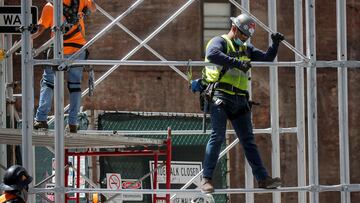How much do construction workers earn in Texas?
Texas is the state with the highest level of employment in construction. Here’s what the average salary is for construction workers in the Lone Star State.

The federal minimum wage is $7.25 per hour in the United States. However, there are jobs that pay more than that and construction work is one of them.
According to the most recent Occupational Employment and Wages report from the Bureau of Labor Statistics (BLS), at the federal level, the average wage for construction workers is $49,280 a year which works out to $23.69 per hour.
That is higher than the median national salary which is $45,300 per year or $21.78 per hour. The median is the salary estimate of the 50th percentile, that is, 50% of workers earn less than the median and the 50% of workers earn more than the median.
Like any other job, the salary of a construction worker varies from place to place. We explain how much you can earn in this profession in Texas, the state with the highest level of employment in the country in this category.
You may be interested in: The Bank of America branches that are closing soon in Texas
How much do construction workers earn in Texas?
Although Texas is the state with the highest level of employment for construction workers, both the average hourly and annual wage is below the national average, but more than double the average federal minimum wage.
According to the BLS Occupational Employment and Wages report, the median annual wage for a construction worker in Texas is about $38,990, while the median hourly wage is $18.74.
Duties of a construction worker
According to the Bureau of Labor Statistics (BLS), the duties of construction workers include performing tasks that involve physical labor on construction sites.
Related stories
Primary duties include operating hand and power tools of all types, such as jackhammers, earth rollers, cement mixers, small mechanical hoists, measuring and surveying equipment, and a variety of other equipment and instruments.
Additionally, they may have to clear and prepare sites, dig trenches, place reinforcements to support the sides of excavations, erect scaffolding, and clear debris and other waste materials.


Complete your personal details to comment